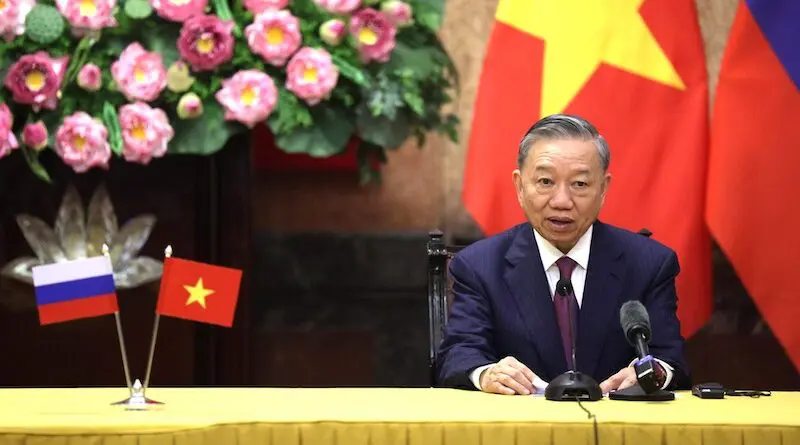THE LAST STALINIST
Nguyen Phu Trong Left Vietnam’s Communist Party Ripe For Strongman Rule – Analysis

President of Vietnam To Lam. Photo Credit: Kremlin.ru
By RFA
By David Hutt
On July 19, the Vietnamese Communist Party announced the death of its general secretary, Nguyen Phu Trong. The previous day, it announced that Trong, 80, ostensibly the most powerful politician in the country, had been relieved of his duties for health reasons.
He had missed several key meetings in recent months, and even when he did attend, he appeared shaky and unwell. He suffered a stroke a few years ago but seemingly bounced back.
However, his near-unprecedented third term in office has been cut short. To Lam, the public security minister and promoted to state President last month, will now assume Trong’s duties.
Having led the party since 2011, Trong attempted to reinvigorate an institution that, by the early 2010s, had become bogged down by individual rivalries, profit-seeking, and self-advancement.
Corruption was so rampant the public was mutinous. Ideology and morality had fallen by the wayside. Pro-democracy movements threatened its monopoly on power. The private sector was not just fantastically wealthy, but desired more political power.
But in what condition does Trong leave the institution he sought to fix?
Externally, its monopoly on power is safer. It has increased repression of activists and democrats while appeasing the public through its high-profile takedown of the corrupt.
The private sector has been constrained, too, so poses no threat to the party’s political authority. The economy has insulated the party from any meaningful repercussions from the West over human rights.
‘Blazing Furnace’
Within the Communist Party, however, Trong leaves behind a mess.
Lam, as public security minister, and Prime Minister Pham Minh Chinh, artfully used Trong’s signature “Blazing Furnace” anti-corruption campaign to advance their own interests, effectively purging anyone who might rival them for Trong’s job in 2026.
More Politburo members have been sacked than at any time in memory. Two presidents have “resigned” in as many years. The Politburo is now filled mostly with military personnel and securocrats, the only two factions – and sometimes rivals – left with power.
Lam, if he does formally become acting general secretary, which the Politburo will have to vote on, is in a prime position to maintain the job in 2026. One imagines he has very different ideas about the nature of the Communist Party than Trong.
Early in the anti-corruption campaign, Trong remarked that he did not want to “break the vase to catch the mice.” That metaphor implied that tackling corruption should shield a delicate Communist Party, not smash it to pieces.
However, in his quest to rid corruption from a corrupt institution, he eroded almost every check the Communist Party of Vietnam had to prevent a supreme leader figure from rising to the top.
Trong violated the three major “norms” that the party introduced in the early 1990s.
Politburo members were expected to retire at 65, and individuals could only occupy the most senior positions for a maximum of two terms. More importantly, no one person could hold at the same time two of the four most powerful positions: General Secretary, State President, Prime Minister, and Chair of the National Assembly.
This “four pillar” (tu tru) system created a form of succession plan. Regular reshuffles and a separation of powers amongst the political elite would prevent the Communist Party from tilting towards dictatorship.
Shattering the norms
The norms created a structure in which politicians could fight over policies, often brutally, but without the entire apparatus collapsing because of division. There could be a regular rotation between different factions and geographic networks, meaning no one group was ascendant for too long.
Hanoi called this “democratic centralism.” Of course, it’s not democracy, but it’s a form of pluralism that, in theory, had prevented the party from descending into dictatorships like North Korea, Cuba, or China under Xi Jinping.
Trong broke every one of these rules.
Between 2018 and 2021, he held the posts of party general secretary and state president simultaneously, the first person to do so since 1986. (Lam seems likely to repeat that.)
Trong passed away during his third term as party chief, the first leader since Le Duan to have that record. He not only constantly had the party flout retirement-age limits for himself – he should have stepped down in 2021, if not earlier – but such exemptions have been handed out like confetti during his tenure.
At the same time, his anti-graft campaign has centralized power among an increasingly small number of Politburo members. Provincial party politics have been purged and constrained to give more power to the central party apparatus. The party dominates the government. The public security ministry is all-seeing.
This was always going to happen. How else do you clean up an uncleanable organization in which power flows up and discipline is enforced only by those above you? The campaign increases the necessity of one section of the party to maintain power indefinitely.
Who designates what is the true morality and which cadres are truly moral? Well, a certain clique of the party running the anti-corruption campaign
In one speech on the theme, Trong urged the party to “strengthen supervision of the use of the power of leading cadres, especially the heads, push up internal supervision within the collective leadership; make public the process of power use according to law for cadres and people to supervise.”
The purge is designed to enforce the view that no one has absolute power above the party. Anyone who uses the power must serve the party and be responsible before it.
Ripe for strongman rule
Yet, not only does the anti-corruption campaign require moral individuals to maintain power at the top of the hierarchy if it is to be successful, it necessitates the permanent renewal of even more moral individuals to lead the party in the future. As such, the anti-corruption campaign is something which can only maintain itself if people with similar views stay in positions of power, which is improbable.
Indeed, Trong was an ideologue, a committed Marxist, yet he is much more of a moralist than many of his comrades. Like Ho Chi Minh, he sees personal vice, not structures, as the root of all problems.
Indeed, he’s a species of socialist, like Che Guevara, who believes that to change a system, you need to change human behavior; that you could perfect human nature and create a “new socialist man” by stripping people of their instincts for greed, self-advancement, and nepotism.
Instead of changing the system, Trong tried to change people.To do so required concentrating power into the hands of a few “moral” apparatchiks.
Trong found out, as most outsiders knew, that those at the pinnacle of the institution got there thanks in large part to the sort of greed, corruption, and nepotism he sought to cure. Opportunists came out of the woodwork knowing that they could get rid of their rivals by alleging corruption.
Everyone of any importance within the party or bureaucracy has skeletons in the closet, so the accusations multiplied – as did the resignations and dismissals. It came down to who decided which skeletons to reveal.
The military and the “securocrats,” security and police cadres, who wrestled control of the Politburo, knew best where to look.
Over the past 13 years, Trong has, to use his metaphor, caught some “mice.” Some big ones, in fact. But corruption remains rampant. And he made the “vase” even more fragile.
In the past, some commentators suggested that Trong was becoming the “Xi Jinping of Vietnam.” He wasn’t.
But his erosion of the Communist Party’s norms and the accumulation of power needed to fight his anti-graft crusade opens the door for a supreme leader, a strongman putsch, a less pluralistic and consensus-based Communist Party.
David Hutt is a research fellow at the Central European Institute of Asian Studies (CEIAS) and the Southeast Asia Columnist at the Diplomat. He writes the Watching Europe In Southeast Asia newsletter. The views expressed here are his own and do not reflect the position of RFA.

RFA
Radio Free Asia’s mission is to provide accurate and timely news and information to Asian countries whose governments prohibit access to a free press. Content used with the permission of Radio Free Asia, 2025 M St. NW, Suite 300, Washington DC 20036.
No comments:
Post a Comment